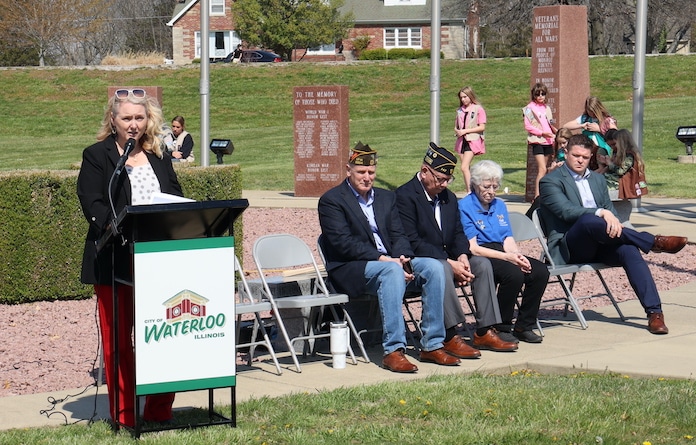Clearing the haze of Vietnam

The City of Waterloo once again recognized Vietnam veterans on Friday, with the community gathering at the Veterans Memorial in Lakeview Park to recognize not only those who served throughout the war but also their family members who helped support them in the years that followed.
Colors were presented at the start of the ceremony by the Metzger-Crook VFW Post 6504 Honor Guard. The Kaskaskia Trail Chorus performed the National Anthem, and the Pledge of Allegiance was led by VFW Auxiliary President Janeth Mogg and members of Waterloo’s Girl Scouts.
Following an opening prayer by Pastor Matt Caraway of Truth Church, Waterloo Mayor Stan Darter shared opening remarks and read a proclamation recognizing the day as Vietnam Veterans Memorial Day in Waterloo.
The first of several main speakers for the event was Clyde Heller, who serves as the commander of Waterloo American Legion Post 747.
Heller, himself a Vietnam War era veteran, expressed thanks to all those who served within Vietnam as well as the families who welcomed them home.
“Continuing to remember March 29 as the National Vietnam War Veterans Day is so important to support the persons who served and returned to communities across our nation with memories of experiences that they could not leave behind,” Heller said. “Thankfully, they were able to find family help, restart their lives serving their country in a multitude of careers, raising their families to appreciate America. And as a Vietnam War era veteran, I thank you, and appreciate greatly those who served in-country.”
Waterloo VFW Commander Mike Douglas expressed similar sentiments.
“Thank you to all the Vietnam veterans,” Douglas said. “Thank you for your service. Our country owes you a debt of gratitude for the examples that you set by following the call when the nation called for your service… Thank you to all the family members and friends who have supported our Vietnam veterans throughout the years. Words cannot describe the gratitude held inside so many hearts for your understanding, friendship and support throughout the years.”
Darter, also a Vietnam veteran, returned to the microphone to offer some additional thoughts, speaking to the perspective of a young man who served in Vietnam.
“One day you’re living the life of a teenager, and five months later you’re a soldier hunting the enemy,” Darter said. “Another word for the enemy is people. A year later, you arrive home dealing with PTSD, battlefield flashbacks, still digesting the atrocities you were immersed in for a year. And everyone you meet hates you. That’s a lot for someone who is 21 years old.”
He further remarked on the struggles of Vietnam veterans, from losing friends in combat to losing friends after the war as many battled addiction, facing all the trauma left over from their time overseas.
Darter then introduced Bethany Prange Booher, a former newspaper journalist and current owner of 618 Creative, as guest speaker for the event.
He highlighted the fact that, though Prange is not herself a veteran, she grew up with a father who served in Vietnam.
“The one constant in all that chaos is the family of veterans trying to cope with behavior they didn’t understand and was impossible to predict,” Darter said. “I chose Bethany Prange as our guest speaker because we always hear what it’s like to be a Vietnam veteran. What we don’t hear is what it’s like to be a member of a family of a Vietnam veteran.”
Prange opened her speech by acknowledging how honored she felt to be asked to speak, though she added that those feelings were tempered somewhat by a sense of unworthiness not being a veteran herself.
She nevertheless offered her perspective as the daughter and granddaughter of veterans and the wife of someone currently in the Air Force.
“I was the child of the early 80s, so I grew up in the somewhat rosy glow of the Reagan era,” Prange said. “But my dad, Merrill Prange, was an explosive and ordnance specialist in Vietnam. So in our house, the cloudy haze of that period hovered over us. Recently, a childhood friend of my dad’s recounted a story of him as a teenager riding a bike through my hometown in the 1960s. I couldn’t figure out why that image so unsettled me, picturing my dad as a teenager, happy and innocent and untouched by the atrocities of war. But then I started wondering about how his life may have been different if he had not gone to Vietnam.”
Prange went on to describe the myriad ways she feels her father’s service impacted him and, in turn, those around him.
She recalled how impressive a storyteller her father was, stressing that she felt as though she had waded through Vietnamese swamps herself given how vividly he spoke.
As she described, Merrill liked the country itself, viewing his service, at least in part, as an opportunity to see some of the world beyond Illinois.
Prange noted, however, that her father didn’t romanticize the war and would make clear how brutal his time in Vietnam could be as he immersed his family in his retellings.
“In our house, conversations about Vietnam were just part of life,” Prange said. “It wasn’t something we avoided, and it didn’t seem out of place. Dad wore his boonie hat and Army fatigue shirts to work in the yard or run errands. He read military books and made us watch movies like ‘Platoon’ and ‘Full Metal Jacket,’ critiquing the inaccuracies in the plot.”
She mentioned various anecdotes about how her father’s stories affected her as a young girl. She used to echo her father in saying she couldn’t sleep “until the choppers were out,” and she once used the term “jungle rot” to describe a rash that had developed on her hands.
Prange particularly recalled the story her father had told about how he lost his leg in Vietnam.
Serving as an explosive and ordnance specialist, Merrill had gone out with another EOD man to disarm an old French land mine.
“Dad took a break and sat on his heels,” Prange said. “When he started to stand up, he heard a small explosion and thought Griffith had hit a mine. When he looked up and saw Griffith staring at him, he realized he was the one lying on the ground bleeding.”
There were a number of other traits her father developed that she mentioned, from keeping a machete under his car seat to stabbing his wooden leg to prove a point in bars.
Prange also discussed some of the more humanizing stories her father never told her which she has only heard more recently from some of his friends.
As she described, there was one incident where he gave a group of children in a village “special chocolate” in advance of a North Vietnamese raid to ensure they’d be out in the woods with diarrhea.
She also brought up an especially deep point of trauma, describing how her father could never stand screaming children following an incident involving several South Vietnamese children and an ordnance shell.
Prange concluded her speech by lamenting the lack of support Vietnam veterans received on their return home, further emphasizing the impact her father’s service had on her.
“When I think now about how growing up the child of a Vietnam veteran has shaped me, I can say a few things with certainty,” Prange said. “I stand and will stand in reverence for the flag and the National Anthem and teach my children to do the same. I spend Memorial Day and Veterans Day at the cemetery with the American Legion. More than anything, I am grateful and reverent to our Vietnam veterans and all those who have served in our military and continue to do so today.”
Following Prange’s speech, recognition pins were handed out to Vietnam veterans in attendance.
The Kaskaskia Trail Chorus performed Amazing Grace and Taps was performed by Russel Wolf to close this year’s ceremony.






